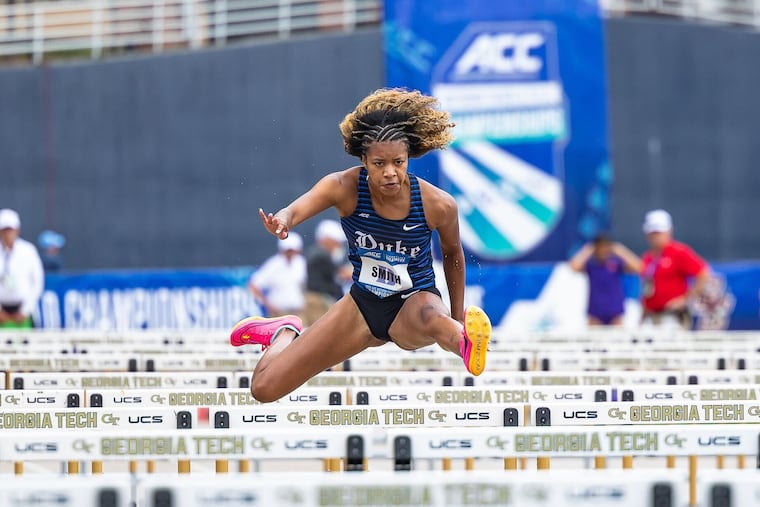Cheltenham standout Brianna Smith is a ‘natural leader’ on the track and for other athletes at Duke
“Not everyone feels as comfortable speaking up as I do, so I feel like that’s something I can’t let go to waste,” said Smith, the president of United Black Athletes at Duke.

National Black Women in Sports Day isn’t officially celebrated until July 7. But who could argue with acknowledging Duke track star Brianna Smith, a Cheltenham graduate, a month early?
This weekend, Smith, a senior who earned All-American honors in March, competed in the heptathlon and the high jump during the NCAA women’s outdoor track and field championships at Hayward Field in Eugene, Ore.
Smith, who won gold in the high jump as a sophomore at the ACC championships, has been a track standout since she stepped on Duke’s campus.
Standing out, though, hasn’t always been easy, Smith said in a recent Zoom interview.
When she first arrived at Duke, Smith explained, “culture shock” set in as she transitioned from a majority Black public school to Duke’s predominantly white campus in Durham, N.C.
» READ MORE: This Conestoga senior is heading off to New Zealand. First, she’ll lead her crew to the national championships.
“I don’t necessarily conform to unhealthy environments,” Smith said. “I’m the kind of person who is going to change the environment that I’m in, so that was really hard for me as a freshman coming into a team that wasn’t the most accepting or the best safe space for a Black woman, and then pushing it to become that place …”
Within a week or two of her arrival on Duke’s campus, Smith joined United Black Athletes, a student-led group created in 2018 to “foster a community while also giving [Black athletes] a voice within the overall Duke community,” according to GoDuke The Magazine.
Smith said microaggressions, or indirect, subtle, or unintentional discriminatory acts against members of a marginalized group, were the main issues she faced.
“I was around a lot of people who had never been around Black people before,” Smith said, “so they would say things to me that — I don’t think they meant any harm — but the effect that it had on me was really big.
“It really would kind of weigh on me and how I felt about myself, hearing these types of things every day, like not wanting to wear a certain hairstyle to practice because I knew someone would say something that would hurt my feelings.
“Little things like that really weigh on you when I should be putting all of my attention and focus into athletics and school because they are hard enough. But [instead] I’m anxious about things like that, or I don’t want to go to team parties because I don’t want someone to say something that will offend me.”
Smith remains grateful to the older members of UBA who were mentors during her early days on campus.
Today, Smith is UBA’s president.
Leadership, however, isn’t new. Smith also was president of the Black Student Union during her junior and senior years at Cheltenham.
“I think I’ve always been a natural leader,” Smith said. “I’m the oldest of six siblings.”
» READ MORE: How these ‘track sisters’ became two of Episcopal Academy’s most decorated athletes
Smith said adults have always recognized her leadership ability and fostered its growth. She isn’t just comfortable in leadership roles, she seeks them out.
“Not everyone feels as comfortable speaking up as I do, so I feel like that’s something I can’t let go to waste,” she said. “I feel like it’s kind of my job in a sense, knowing that I can speak up and I can articulate myself well … and not only for myself but also for other people when they can’t necessarily do that for themselves.”
Perhaps to that end, Smith, who recently graduated from Duke with a degree in biology, will spend time at UCLA studying sickle cell disease, a hereditary condition that affects the shape of red blood cells and, according to the Mayo Clinic, “most commonly affects people of African, Mediterranean, and Middle Eastern descent.” After that, she plans to pursue a Ph.D.
“I’ve always wanted to look into diseases that disproportionately affect those communities that are overlooked in research,” she said, “and I want to use my brain and my curiosity toward something that will help my people.”
On Friday, Smith competed in the first day of the two-day heptathlon. She finished ninth in the 200 meters, 21st in the shot put, tied for ninth in the high jump, and 17th in the 100-meter hurdles, standing 13th overall with 3,444 points.
On Saturday, she finished 22nd in the 800 meters, 23rd in the long jump, and 22nd in the javelin. Smith finished 21st overall in the heptathlon, scoring 5,355 points.
At the Penn Relays in April, Smith finished second in the high jump.
Smith said the adversity she has faced thus far has indirectly helped her on the track.
“In a way, even though, of course, I don’t think anyone should have to go through what I’ve gone through, I do think it really taught me to be my authentic self,” she said.
“And then, of course, the determination of not letting anything or anyone stop me from doing what I want, being who I want to be, and not letting anyone put me in a box or tell me what I can or can’t do or who I can or can’t be.”